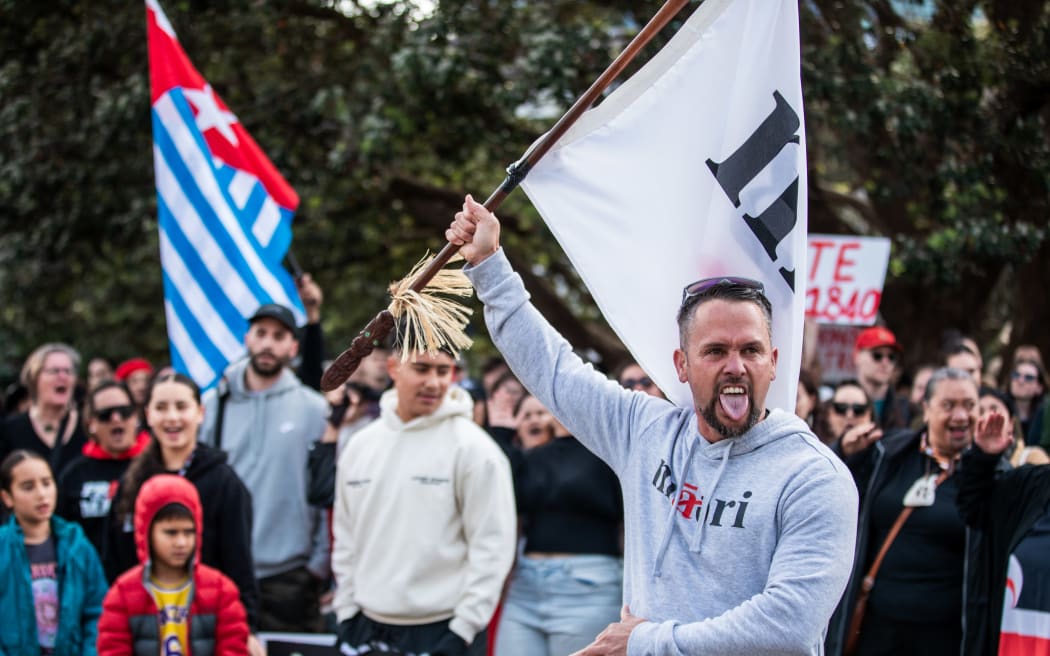
Labour leader Chris Hipkins at Parliament. Photo: RNZ / Samuel Rillstone
The opposition has laid into the government's plan to reintroduce a "three strikes" regime, saying it is inequitable and there is very little evidence it works.
The government says the new policy will apply only to sentences of at least two years, give judges more discretion in cases where harsh outcomes would be "manifestly unjust", and bring in some benefit for offenders on their final strike to plead guilty.
Prime Minister Christopher Luxon, who announced the move alongside Associate Justice Minister Nicole McKee earlier today, said criminals "need to know that their actions will not be tolerated by this government, and we are determined to keep our community safe".
But Labour leader Chris Hipkins pointed to the cuts to Customs and said it showed the government's priorities were all wrong.
"On a day when the government are trying to talk tough about crime, they're rolling out the welcome mat to organised crime, and there is an inescapable link between organised crime and violent offending in New Zealand," he said.
He said Three Strikes was not good policy, and there was no evidence it would reduce violent offending, but "it's difficult to critique an announcement of an announcement".
"I'm very sceptical about mandatory minimums generally. If you look around the world ... where they are imposed they generally lead to unjust and inequitable outcomes.
"I think when Parliament starts telling judges how to rule, then actually we start to break down some pretty basic, important constitutional principles."
In a statement, Labour's justice spokesperson Duncan Webb said Three Strikes had "little evidential backing" and the government was reviving it "just to look tough".
"This is political posturing of the worst kind," he said. "There was almost no evidence to show it deters offending, and instead it resulted in severe distortions in sentencing third strike offenders."
Luxon said criminals "need to know that their actions will not be tolerated by this government, and we are determined to keep our community safe".
When asked what advice he had seen the law would actually reduce violent crime, he referred repeatedly instead to previous examples where similar laws had been brought in.
"Well, again, what we've seen is we know that actually we've got to be tough on crime," he said. "We know that we have to send a message very clearly.
"We've seen different pieces of advice, there's been advice from previous examples where we've had it before, and likewise we've seen examples from overseas jurisdictions like California."

Tamatha Paul speaking at a climate protest this month. Photo: RNZ/Samuel Rillstone
"I am telling you the advice is the counterfactual - which is what we've seen happen over the last six years. Violent crime's gone up over 30 percent, year in, year out, gotta stop," he said.
Webb pointed to a case where a person was jailed for 10 years, when the judge had said 18 months would ordinarily have been imposed, and another case where someone was jailed for seven years for patting a prison guard's bottom.
"That was unjust and can still occur under this new proposal. Repeated offending is already an aggravating factor. Judges can already impose sentences of this length, where appropriate. All this law does is continue the government's attack on the judiciary by removing sentencing discretion.
The Green Party's Justice spokesperson Tamatha Paul said it was an unwelcome return to a "failed American-style approach to justice" that would lead to "grossly unfair results that disproportionately impact Māori".
"It is shameful that New Zealand has one of the highest imprisonment rates in the developed world. This is despite mounting evidence that mass incarceration has failed to bring down rates of crime, keep communities safe, or rehabilitate those in our system."
The government should tackle the causes of offending, putting its efforts into mental health care, addiction treatment, housing and income support, she said.
The government was "hell-bent" on funnelling more people into prison, "despite mounting evidence that mass incarceration has failed to bring down rates of crime, keep communities safe, or rehabilitate those in our system.
"The three strikes law means ... no matter what changes you make towards being a better person, your life is reduced down to these rigid and inhumane three strikes and there's nothing a judge can do about it."

Tākuta Ferris at a protest against the government late last year. Photo: RNZ / Samuel Rillstone
Te Pāti Māori's Justice spokesperson Tākuta Ferris said the law was destructive, ineffective, and targeted those "too brown to be white" making worse what he said was an "inherently biased and racist criminal justice system".
"During the time Three Strikes was in place in Aotearoa, Māori and Pasifika received over 50 percent of the strikes, and 63 percent of those with a second strike were Māori," he said.
"Modelled on US law that disproportionately targeted African Americans, Three Strikes has unjustly perpetuated racism and ensnared Māori with no evidence of reducing crime."
"The only time Māori receive special treatment is when we are dealing with the criminal justice system. It has profiled and targeted tangata whenua for as long as it has existed in this country. The reintroduction of Three Strikes is to maintain this status quo."
He pointed to research from the United States in 2022 which showed a similar law there did not address crime, although the paper noted California's approach was the most severe of the 24 US states and applied to all felonies regardless of whether they were classified as serious or violent.
Luxon also responded to the criticism of the previous bill that it disproportionately affected Māori and Pacific Islanders, saying Māori were also more likely to be the victims of crime.
"Our goal here is to incarcerate violent offenders, violent sexual offenders. I don't care whether they're Māori or non-Māori, they're coming off our streets because they cause pain and suffering to regular New Zealanders," he said.
"If this piece of legislation actually saves one person from the pain and suffering caused by violent, sexual activity, violent sexual criminal activity, then that's a good thing ... that is well worth it, and I make no apologies about it."






